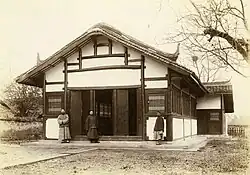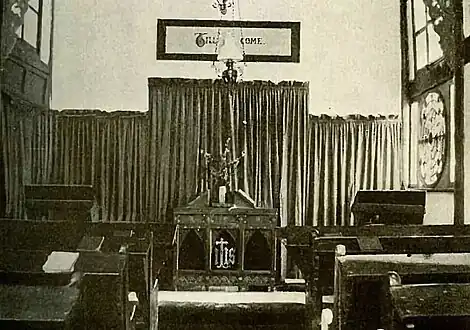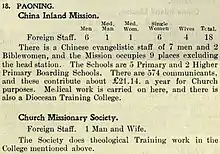| Trinity Church, Langzhong | |
|---|---|
| Protestant Episcopal Church | |
三一堂 | |
 Trinity Church in 1899. The persons represented as standing outside are Bishop Cassels, Mr Williams, and the Chinese churchwarden. Photograph by Isabella Bird. | |
| Location | 46 Langjiaguai Street, Langzhong, Sichuan |
| Country | China |
| Denomination | Sichuanese Protestant |
| Previous denomination | Church in China (under the jurisdiction of the Church of England)[1]:5 |
| Churchmanship | Low church evangelical |
| History | |
| Status | Church |
| Founded | 1893 |
| Founder(s) | William Cassels (China Inland Mission) |
| Dedication | Holy Trinity |
| Consecrated | 25 December 1893 |
| Past bishop(s) | William Cassels |
| Architecture | |
| Functional status | Active |
| Style | Sichuanese |
| Groundbreaking | 1893 |
| Administration | |
| Province | China (formerly) |
| Diocese | Szechwan (formerly) East Szechwan (formerly; since 1936) |
Trinity Church (Chinese: 三一堂; pinyin: Sānyī táng; Wade–Giles: San1-i1 tʽang2; also referred to as Protestant Episcopal Church[1]:9) is a Protestant church situated on Langjiaguai Street in the county-level city of Langzhong, Nanchong, Sichuan Province. Founded in 1893, the building is the city's oldest surviving Anglican church, formerly belonging to the East Szechwan Diocese of the Church in China.[2][3]
History


Trinity Church was built in 1893 in traditional Sichuanese architectural style, under the supervision of William Cassels, one of the Cambridge Seven who was going to be the missionary bishop of the Diocese of Western China.[4]
As the first Anglican church built in Langzhong (then known as Paoning), the chosen style is in consideration of being more acceptable to the locals. It adopted the style of traditional residential buildings in northern Sichuan, fully blended into the surroundings.[5]
The British explorer Isabella Bird described in her book The Yangtze Valley and Beyond, that the church 'is Chinese in style, the chancel windows are "glazed" with coloured paper to simulate stained glass, and it is seated for two hundred'.[1]:6 Despite its small size, 'the church was crammed at matins, and crowds stood outside, where they could both see and hear, this publicity contrasting with the Roman practice.'[1]:8
More than ten years of missionary work yielded visible results, Trinity Church was no longer capable of accommodating the growing congregation. Implementation of a cathedral construction project started in 1908, after a series of problems, the neo-Gothic Cathedral of St John the Evangelist was eventually built on Yangtianjing Street, just 50 metres away from Trinity Church.[5]
After the communist takeover of China in 1949, Christian Churches in China were forced to sever their ties with respective overseas Churches, which has thus led to the merging of Trinity Church into the communist-established Three-Self Patriotic Church.
Today, the traditional environment has long gone. Trinity Church, however, maintains its original style, with its serenity that is free from the bustling tourist area nearby.[5]
See also
- Anglicanism in Sichuan
- Category:Former Anglican churches in Sichuan
References
- 1 2 3 4 Bird-Bishop, Isabella (1900). The Yangtze Valley and Beyond (volume II). London: John Murray.
- ↑ Wang, Meng (2010). ""剑桥七杰"与阆中圣约翰教堂" [The 'Cambridge Seven' and St John's Church in Langzhong]. 守望吾土吾乡 (in Simplified Chinese). Yinchuan: Ningxia People's Publishing House. ISBN 9787227044475.
- ↑ Gray, G. F. S. (1996). Anglicans in China: A History of the Zhonghua Shenggong Hui (Chung Hua Sheng Kung Huei). Episcopal China Mission History Project. p. 34. CiteSeerX 10.1.1.695.4591.
- ↑ Wong, Sik Pui (2010). "死而後已蓋士利" [Bishop William Wharton Cassels, 1858–1925] (PDF). 大使命 [Great Commission] (in Traditional Chinese) (88): 15. Retrieved 21 May 2021.
- 1 2 3 Huai, Kang (2016). "基督教堂的中国风 记四川阆中三一堂" [Chinese-style Christian Church: An Introduction to the Trinity Church of Langzhong]. 中国宗教 [China Religion] (in Simplified Chinese) (4): 78–79. ISSN 1006-7558.
